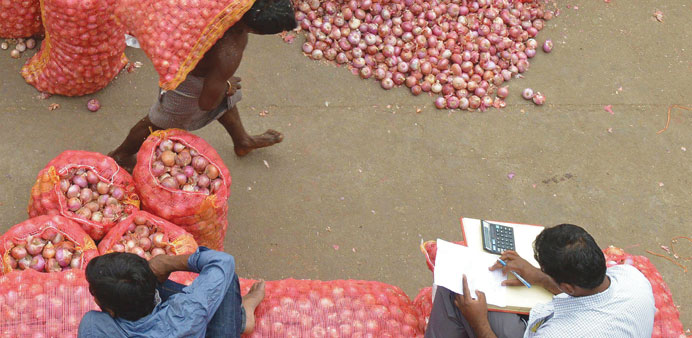A labourer carries a bag of onions towards waiting transport vehicles as traders watch at a wholesale onion market yard in Hyderabad yesterday. The government said it would impose a minimum export price (MEP) to discourage their export and control the rising price of the vegetable.
Reuters/New Delhi
India’s new government has imposed export restrictions on certain farm commodities and ordered a crackdown on hoarding to control rising food prices, days after wholesale price inflation hit a five-month high.
A jump in prices of potatoes and onions last month drove inflation to 6.01% from 5.20% in April, contributing to a sell-off in financial markets.
Prime Minister Narendra Modi, who was elected last month amid widespread anger over rising prices, has made tackling inflation his top priority.
Forecasts of weak monsoon rains that irrigate much of India’s food production have added to inflation fears, and volatile vegetable prices have risen by double digits.
Finance Minister Arun Jaitley, who held a meeting on Tuesday to decide steps to control food inflation, said the government was keeping a close watch on the price movements of 22 commodities and would offload additional rice stocks in the market to prevent a build-up in inflationary expectations.
The government is planning to release 5mn tonnes of rice from state stockpiles to curb inflation, Food Minister Ram Vilas Paswan told reporters.
“The government would be releasing additional rice stocks from government warehouses for supplies to the state governments,” Paswan told reporters.
The government also imposed a minimum export price on onions of $300 per tonne from $150 per tonne to discourage overseas shipments and Jaitley said a similar curb would be imposed on exports of potatoes.
“Even though the increase (in food prices) has only been marginal, we don’t want anybody to exploit the situation,” he told reporters after the meeting. “And therefore, in anticipation of any further market reaction, a series of steps have been decided and they are being put into place.”
The imposition of MEP will help arrest the rise in prices, the government said.
“Imposition of MEP on onion export is expected to help in arresting the rise in prices and stabilising the onion prices in the domestic markets and balance the interests of both farmers and consumers,” the ministry of commerce and industry said in a statement.
An Inter-Ministerial Committee decided to impose the MEP. The price has jumped by almost 50% in some parts of the country in recent weeks largely due to hoardings on fear of a weak monsoon.
In their meeting, the committee observed that the model rates in the producing markets have shown an increase during the second week of June and the retail and wholesale prices in four metropolitan cities have also shown a steady increase compared to prices prevailing on May 1, the ministry’s statement said.
The weather department predicts below-average rainfall between June-September this year, which could hit summer crops such as rice, corn, soybean and cotton.
In addition to fears of food inflation, lower grain production could reduce the volume of rice exports from India, the world’s top supplier.
“There are not many new contracts being signed for Indian rice as Thailand is selling rice at much cheaper prices,” said one Singapore-based trader. “They have food inflation now and if there is El Nino, India might be forced to keep its rice at home.”
A decline in rice exports from India could underpin global prices, although gains will be capped by plentiful world supplies, traders said.
Summer monsoon rains are vital for 55% of India’s farmlands that lack irrigation facilities. In 2009, patchy rains led to the worst drought in nearly four decades and drove annual food inflation up to more than 21%.
India has stockpiles of staples like rice, wheat and sugar that can be released, but the government has limited means to control surges in the cost of fruit and vegetables, which have the largest impact on food inflation.
Jaitley asked state governments s to amend their laws to crack down on speculative hoarding in anticipation of a weak monsoon and boost the supply of fruit and vegetables in open markets.
New Delhi will also extend a line of credit to state governments to import pulses and edible oil to bridge the shortfall in the domestic market, he said.

